Assessing the ILO's Response to Globalization: An In-Depth Analysis
VerifiedAdded on 2023/01/12
|9
|3040
|59
Essay
AI Summary
This essay critically assesses the International Labour Organisation's (ILO) response to the challenges posed by globalization. It begins with an overview of the ILO, its history, and its tripartite structure, which includes workers, employers, and governments. The essay then defines globalization and its impact, including international migration, inequality, and child labor. The main body analyzes arguments regarding the ILO's effectiveness, including the claim that the ILO has failed to provide a coherent response. It examines the ILO's responses, such as the 'decent work' initiative, and critiques them. The essay also acknowledges some successes, such as efforts to reduce child labor. Finally, the essay offers recommendations for how the ILO could improve its approach to address the evolving labor market and safeguard workers' interests in the face of globalization. The essay concludes by emphasizing the need for the ILO to adapt and evolve to remain relevant.
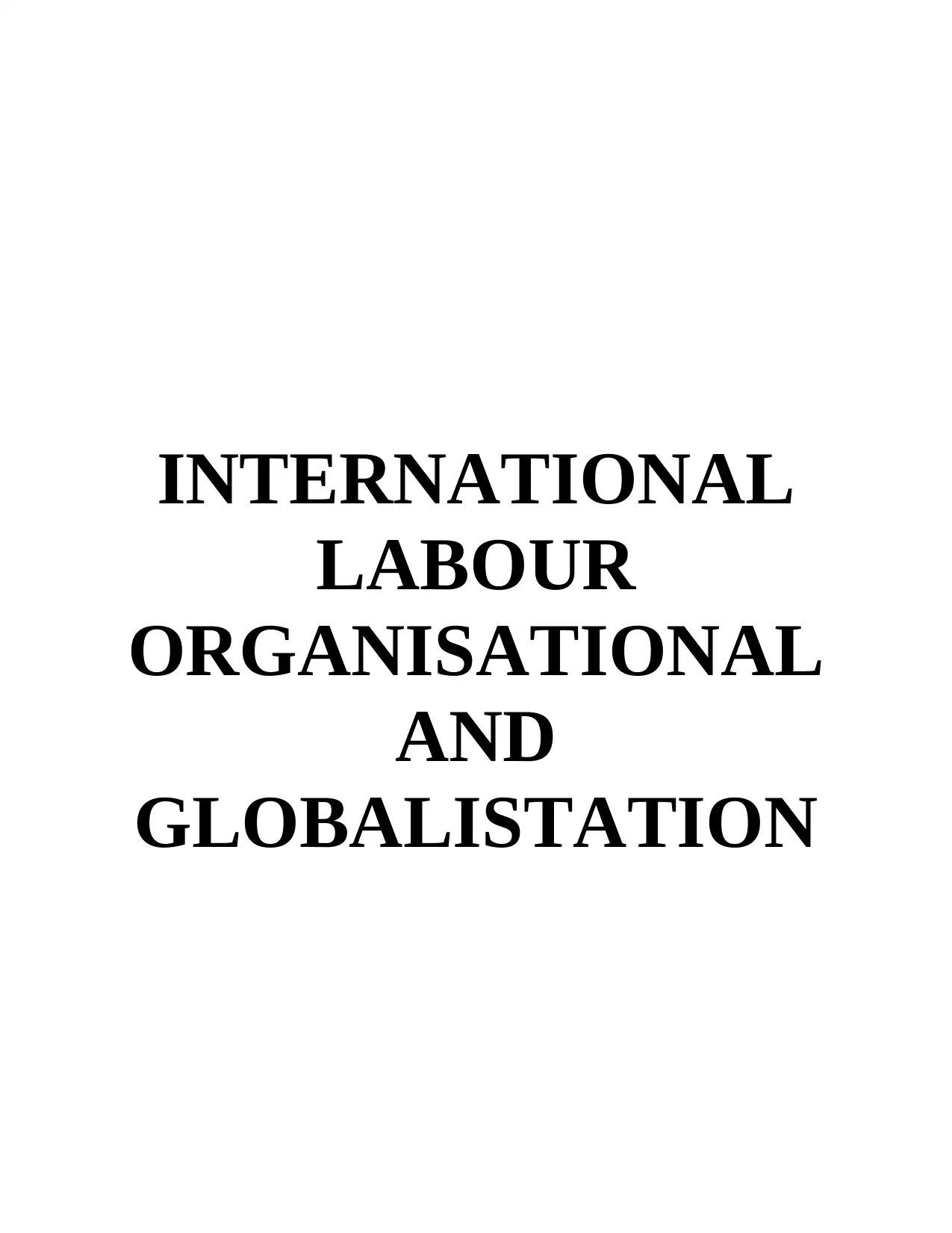
INTERNATIONAL
LABOUR
ORGANISATIONAL
AND
GLOBALISTATION
LABOUR
ORGANISATIONAL
AND
GLOBALISTATION
Paraphrase This Document
Need a fresh take? Get an instant paraphrase of this document with our AI Paraphraser
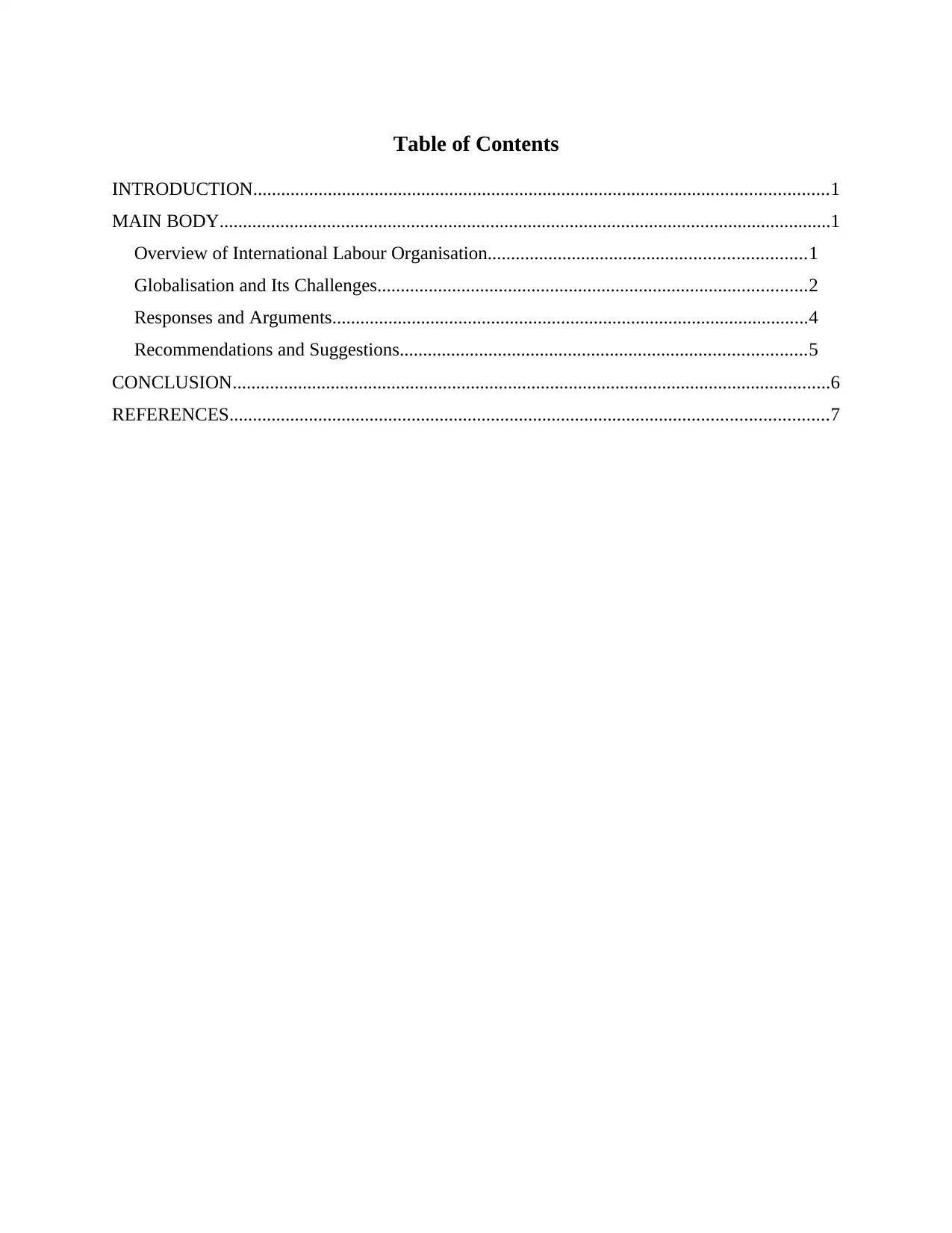
Table of Contents
INTRODUCTION...........................................................................................................................1
MAIN BODY...................................................................................................................................1
Overview of International Labour Organisation....................................................................1
Globalisation and Its Challenges............................................................................................2
Responses and Arguments......................................................................................................4
Recommendations and Suggestions.......................................................................................5
CONCLUSION................................................................................................................................6
REFERENCES................................................................................................................................7
INTRODUCTION...........................................................................................................................1
MAIN BODY...................................................................................................................................1
Overview of International Labour Organisation....................................................................1
Globalisation and Its Challenges............................................................................................2
Responses and Arguments......................................................................................................4
Recommendations and Suggestions.......................................................................................5
CONCLUSION................................................................................................................................6
REFERENCES................................................................................................................................7
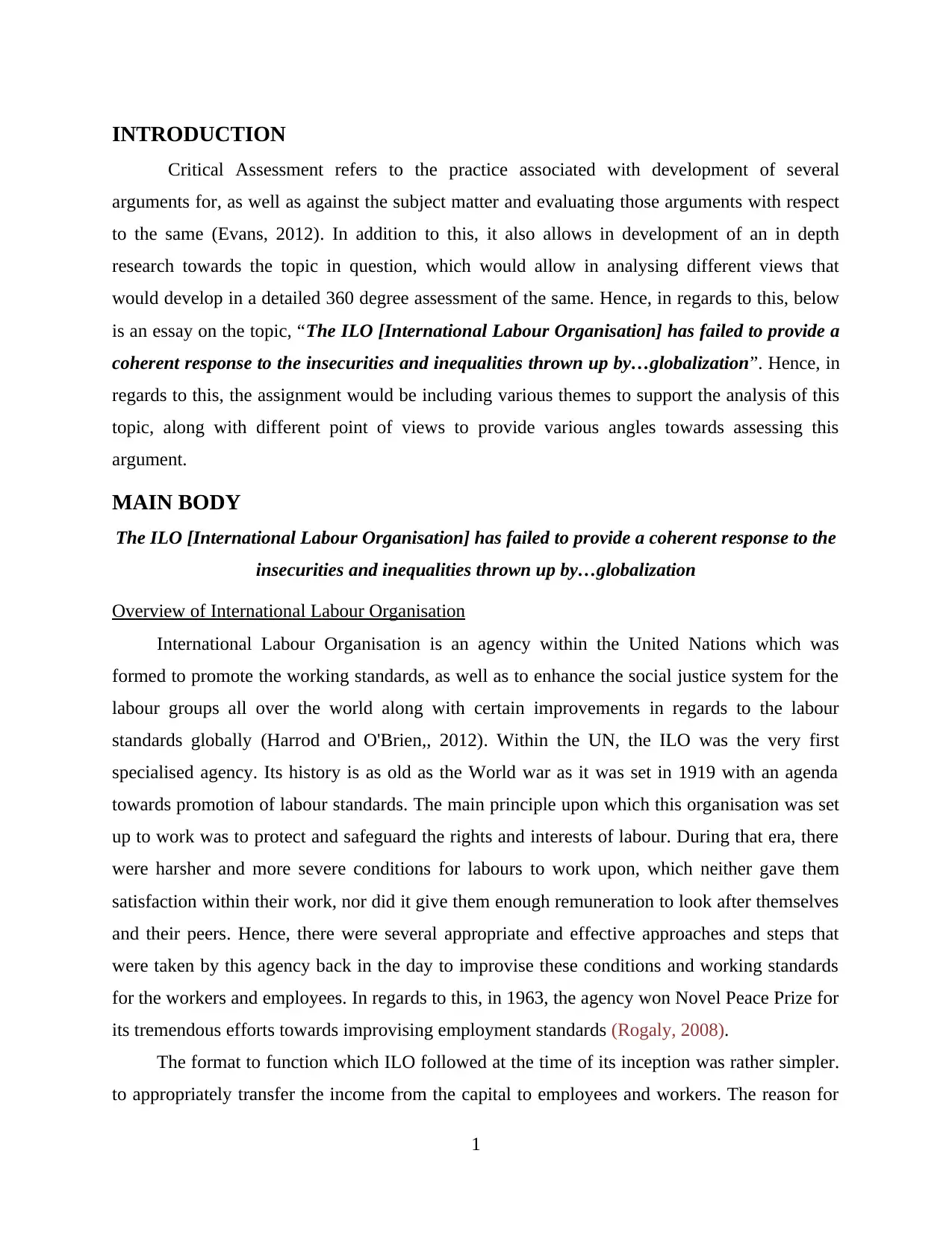
INTRODUCTION
Critical Assessment refers to the practice associated with development of several
arguments for, as well as against the subject matter and evaluating those arguments with respect
to the same (Evans, 2012). In addition to this, it also allows in development of an in depth
research towards the topic in question, which would allow in analysing different views that
would develop in a detailed 360 degree assessment of the same. Hence, in regards to this, below
is an essay on the topic, “The ILO [International Labour Organisation] has failed to provide a
coherent response to the insecurities and inequalities thrown up by…globalization”. Hence, in
regards to this, the assignment would be including various themes to support the analysis of this
topic, along with different point of views to provide various angles towards assessing this
argument.
MAIN BODY
The ILO [International Labour Organisation] has failed to provide a coherent response to the
insecurities and inequalities thrown up by…globalization
Overview of International Labour Organisation
International Labour Organisation is an agency within the United Nations which was
formed to promote the working standards, as well as to enhance the social justice system for the
labour groups all over the world along with certain improvements in regards to the labour
standards globally (Harrod and O'Brien,, 2012). Within the UN, the ILO was the very first
specialised agency. Its history is as old as the World war as it was set in 1919 with an agenda
towards promotion of labour standards. The main principle upon which this organisation was set
up to work was to protect and safeguard the rights and interests of labour. During that era, there
were harsher and more severe conditions for labours to work upon, which neither gave them
satisfaction within their work, nor did it give them enough remuneration to look after themselves
and their peers. Hence, there were several appropriate and effective approaches and steps that
were taken by this agency back in the day to improvise these conditions and working standards
for the workers and employees. In regards to this, in 1963, the agency won Novel Peace Prize for
its tremendous efforts towards improvising employment standards (Rogaly, 2008).
The format to function which ILO followed at the time of its inception was rather simpler.
to appropriately transfer the income from the capital to employees and workers. The reason for
1
Critical Assessment refers to the practice associated with development of several
arguments for, as well as against the subject matter and evaluating those arguments with respect
to the same (Evans, 2012). In addition to this, it also allows in development of an in depth
research towards the topic in question, which would allow in analysing different views that
would develop in a detailed 360 degree assessment of the same. Hence, in regards to this, below
is an essay on the topic, “The ILO [International Labour Organisation] has failed to provide a
coherent response to the insecurities and inequalities thrown up by…globalization”. Hence, in
regards to this, the assignment would be including various themes to support the analysis of this
topic, along with different point of views to provide various angles towards assessing this
argument.
MAIN BODY
The ILO [International Labour Organisation] has failed to provide a coherent response to the
insecurities and inequalities thrown up by…globalization
Overview of International Labour Organisation
International Labour Organisation is an agency within the United Nations which was
formed to promote the working standards, as well as to enhance the social justice system for the
labour groups all over the world along with certain improvements in regards to the labour
standards globally (Harrod and O'Brien,, 2012). Within the UN, the ILO was the very first
specialised agency. Its history is as old as the World war as it was set in 1919 with an agenda
towards promotion of labour standards. The main principle upon which this organisation was set
up to work was to protect and safeguard the rights and interests of labour. During that era, there
were harsher and more severe conditions for labours to work upon, which neither gave them
satisfaction within their work, nor did it give them enough remuneration to look after themselves
and their peers. Hence, there were several appropriate and effective approaches and steps that
were taken by this agency back in the day to improvise these conditions and working standards
for the workers and employees. In regards to this, in 1963, the agency won Novel Peace Prize for
its tremendous efforts towards improvising employment standards (Rogaly, 2008).
The format to function which ILO followed at the time of its inception was rather simpler.
to appropriately transfer the income from the capital to employees and workers. The reason for
1
⊘ This is a preview!⊘
Do you want full access?
Subscribe today to unlock all pages.

Trusted by 1+ million students worldwide
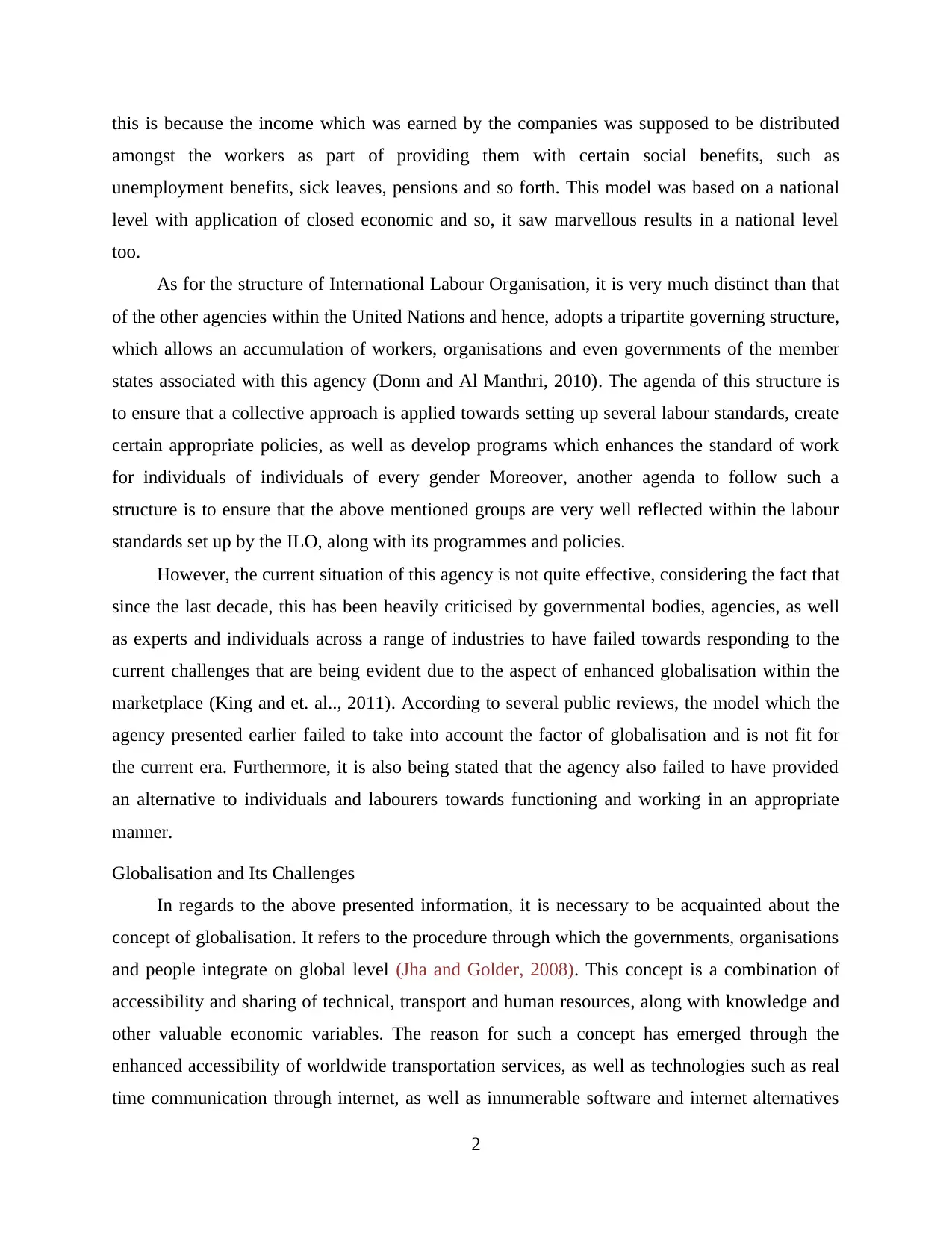
this is because the income which was earned by the companies was supposed to be distributed
amongst the workers as part of providing them with certain social benefits, such as
unemployment benefits, sick leaves, pensions and so forth. This model was based on a national
level with application of closed economic and so, it saw marvellous results in a national level
too.
As for the structure of International Labour Organisation, it is very much distinct than that
of the other agencies within the United Nations and hence, adopts a tripartite governing structure,
which allows an accumulation of workers, organisations and even governments of the member
states associated with this agency (Donn and Al Manthri, 2010). The agenda of this structure is
to ensure that a collective approach is applied towards setting up several labour standards, create
certain appropriate policies, as well as develop programs which enhances the standard of work
for individuals of individuals of every gender Moreover, another agenda to follow such a
structure is to ensure that the above mentioned groups are very well reflected within the labour
standards set up by the ILO, along with its programmes and policies.
However, the current situation of this agency is not quite effective, considering the fact that
since the last decade, this has been heavily criticised by governmental bodies, agencies, as well
as experts and individuals across a range of industries to have failed towards responding to the
current challenges that are being evident due to the aspect of enhanced globalisation within the
marketplace (King and et. al.., 2011). According to several public reviews, the model which the
agency presented earlier failed to take into account the factor of globalisation and is not fit for
the current era. Furthermore, it is also being stated that the agency also failed to have provided
an alternative to individuals and labourers towards functioning and working in an appropriate
manner.
Globalisation and Its Challenges
In regards to the above presented information, it is necessary to be acquainted about the
concept of globalisation. It refers to the procedure through which the governments, organisations
and people integrate on global level (Jha and Golder, 2008). This concept is a combination of
accessibility and sharing of technical, transport and human resources, along with knowledge and
other valuable economic variables. The reason for such a concept has emerged through the
enhanced accessibility of worldwide transportation services, as well as technologies such as real
time communication through internet, as well as innumerable software and internet alternatives
2
amongst the workers as part of providing them with certain social benefits, such as
unemployment benefits, sick leaves, pensions and so forth. This model was based on a national
level with application of closed economic and so, it saw marvellous results in a national level
too.
As for the structure of International Labour Organisation, it is very much distinct than that
of the other agencies within the United Nations and hence, adopts a tripartite governing structure,
which allows an accumulation of workers, organisations and even governments of the member
states associated with this agency (Donn and Al Manthri, 2010). The agenda of this structure is
to ensure that a collective approach is applied towards setting up several labour standards, create
certain appropriate policies, as well as develop programs which enhances the standard of work
for individuals of individuals of every gender Moreover, another agenda to follow such a
structure is to ensure that the above mentioned groups are very well reflected within the labour
standards set up by the ILO, along with its programmes and policies.
However, the current situation of this agency is not quite effective, considering the fact that
since the last decade, this has been heavily criticised by governmental bodies, agencies, as well
as experts and individuals across a range of industries to have failed towards responding to the
current challenges that are being evident due to the aspect of enhanced globalisation within the
marketplace (King and et. al.., 2011). According to several public reviews, the model which the
agency presented earlier failed to take into account the factor of globalisation and is not fit for
the current era. Furthermore, it is also being stated that the agency also failed to have provided
an alternative to individuals and labourers towards functioning and working in an appropriate
manner.
Globalisation and Its Challenges
In regards to the above presented information, it is necessary to be acquainted about the
concept of globalisation. It refers to the procedure through which the governments, organisations
and people integrate on global level (Jha and Golder, 2008). This concept is a combination of
accessibility and sharing of technical, transport and human resources, along with knowledge and
other valuable economic variables. The reason for such a concept has emerged through the
enhanced accessibility of worldwide transportation services, as well as technologies such as real
time communication through internet, as well as innumerable software and internet alternatives
2
Paraphrase This Document
Need a fresh take? Get an instant paraphrase of this document with our AI Paraphraser
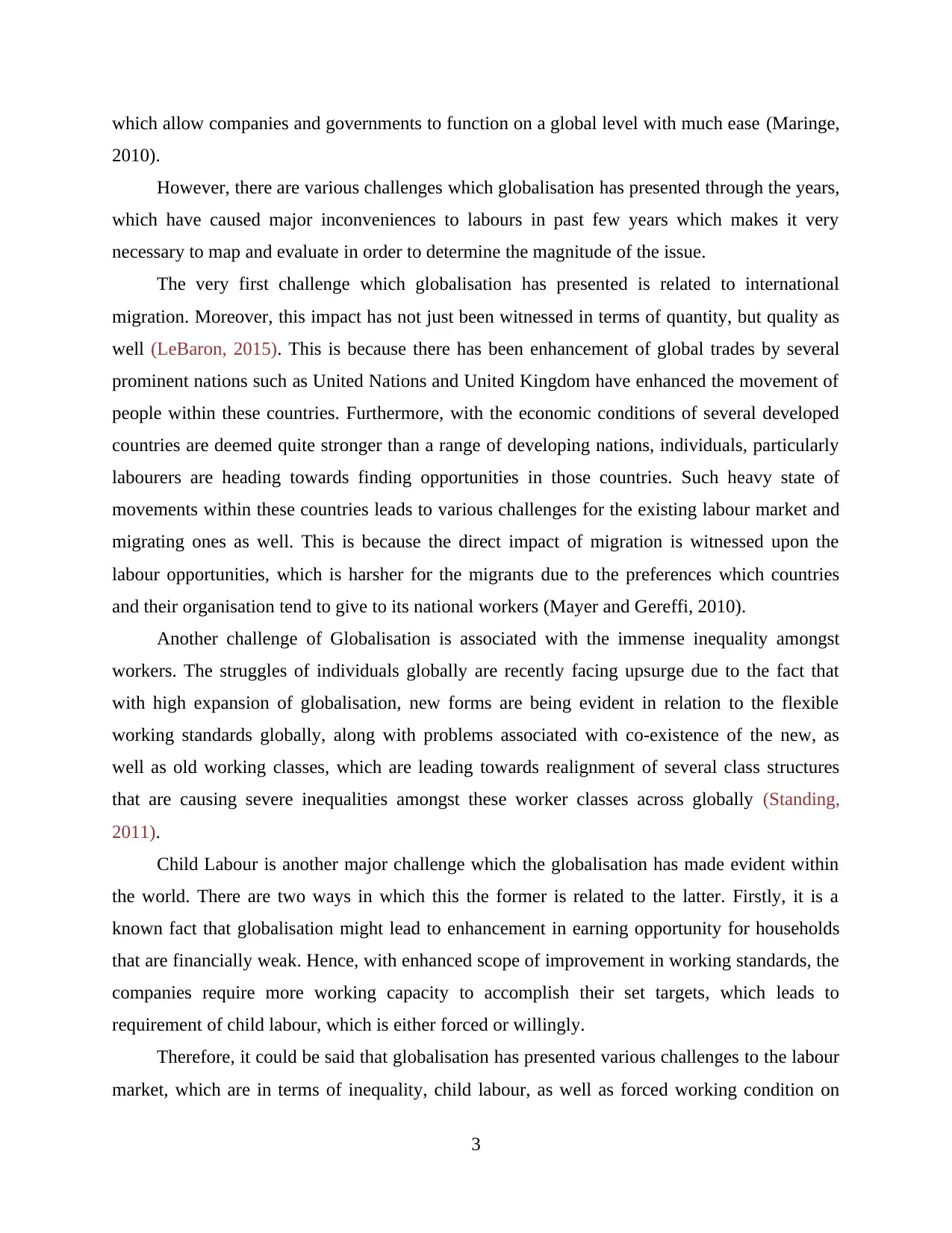
which allow companies and governments to function on a global level with much ease (Maringe,
2010).
However, there are various challenges which globalisation has presented through the years,
which have caused major inconveniences to labours in past few years which makes it very
necessary to map and evaluate in order to determine the magnitude of the issue.
The very first challenge which globalisation has presented is related to international
migration. Moreover, this impact has not just been witnessed in terms of quantity, but quality as
well (LeBaron, 2015). This is because there has been enhancement of global trades by several
prominent nations such as United Nations and United Kingdom have enhanced the movement of
people within these countries. Furthermore, with the economic conditions of several developed
countries are deemed quite stronger than a range of developing nations, individuals, particularly
labourers are heading towards finding opportunities in those countries. Such heavy state of
movements within these countries leads to various challenges for the existing labour market and
migrating ones as well. This is because the direct impact of migration is witnessed upon the
labour opportunities, which is harsher for the migrants due to the preferences which countries
and their organisation tend to give to its national workers (Mayer and Gereffi, 2010).
Another challenge of Globalisation is associated with the immense inequality amongst
workers. The struggles of individuals globally are recently facing upsurge due to the fact that
with high expansion of globalisation, new forms are being evident in relation to the flexible
working standards globally, along with problems associated with co-existence of the new, as
well as old working classes, which are leading towards realignment of several class structures
that are causing severe inequalities amongst these worker classes across globally (Standing,
2011).
Child Labour is another major challenge which the globalisation has made evident within
the world. There are two ways in which this the former is related to the latter. Firstly, it is a
known fact that globalisation might lead to enhancement in earning opportunity for households
that are financially weak. Hence, with enhanced scope of improvement in working standards, the
companies require more working capacity to accomplish their set targets, which leads to
requirement of child labour, which is either forced or willingly.
Therefore, it could be said that globalisation has presented various challenges to the labour
market, which are in terms of inequality, child labour, as well as forced working condition on
3
2010).
However, there are various challenges which globalisation has presented through the years,
which have caused major inconveniences to labours in past few years which makes it very
necessary to map and evaluate in order to determine the magnitude of the issue.
The very first challenge which globalisation has presented is related to international
migration. Moreover, this impact has not just been witnessed in terms of quantity, but quality as
well (LeBaron, 2015). This is because there has been enhancement of global trades by several
prominent nations such as United Nations and United Kingdom have enhanced the movement of
people within these countries. Furthermore, with the economic conditions of several developed
countries are deemed quite stronger than a range of developing nations, individuals, particularly
labourers are heading towards finding opportunities in those countries. Such heavy state of
movements within these countries leads to various challenges for the existing labour market and
migrating ones as well. This is because the direct impact of migration is witnessed upon the
labour opportunities, which is harsher for the migrants due to the preferences which countries
and their organisation tend to give to its national workers (Mayer and Gereffi, 2010).
Another challenge of Globalisation is associated with the immense inequality amongst
workers. The struggles of individuals globally are recently facing upsurge due to the fact that
with high expansion of globalisation, new forms are being evident in relation to the flexible
working standards globally, along with problems associated with co-existence of the new, as
well as old working classes, which are leading towards realignment of several class structures
that are causing severe inequalities amongst these worker classes across globally (Standing,
2011).
Child Labour is another major challenge which the globalisation has made evident within
the world. There are two ways in which this the former is related to the latter. Firstly, it is a
known fact that globalisation might lead to enhancement in earning opportunity for households
that are financially weak. Hence, with enhanced scope of improvement in working standards, the
companies require more working capacity to accomplish their set targets, which leads to
requirement of child labour, which is either forced or willingly.
Therefore, it could be said that globalisation has presented various challenges to the labour
market, which are in terms of inequality, child labour, as well as forced working condition on
3
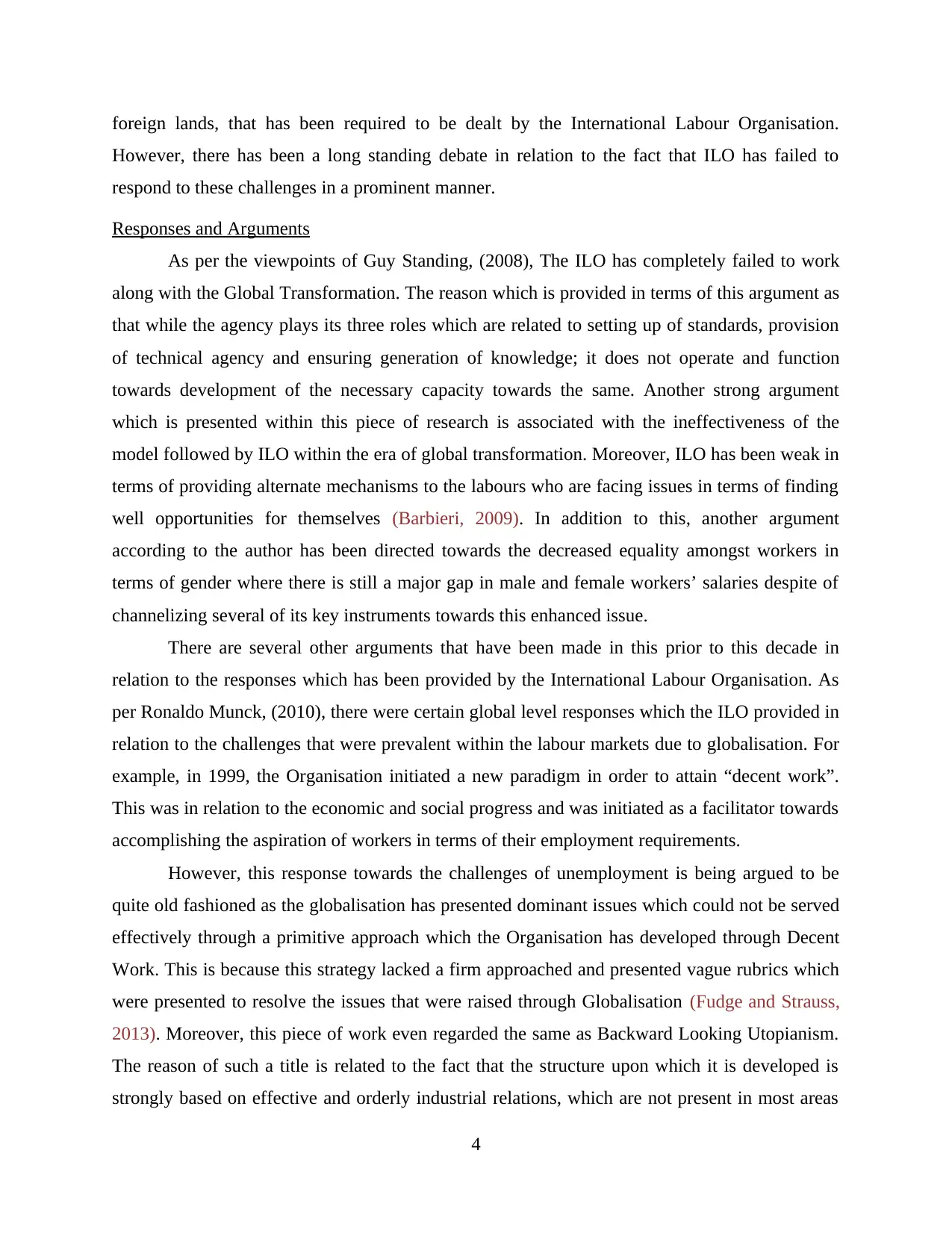
foreign lands, that has been required to be dealt by the International Labour Organisation.
However, there has been a long standing debate in relation to the fact that ILO has failed to
respond to these challenges in a prominent manner.
Responses and Arguments
As per the viewpoints of Guy Standing, (2008), The ILO has completely failed to work
along with the Global Transformation. The reason which is provided in terms of this argument as
that while the agency plays its three roles which are related to setting up of standards, provision
of technical agency and ensuring generation of knowledge; it does not operate and function
towards development of the necessary capacity towards the same. Another strong argument
which is presented within this piece of research is associated with the ineffectiveness of the
model followed by ILO within the era of global transformation. Moreover, ILO has been weak in
terms of providing alternate mechanisms to the labours who are facing issues in terms of finding
well opportunities for themselves (Barbieri, 2009). In addition to this, another argument
according to the author has been directed towards the decreased equality amongst workers in
terms of gender where there is still a major gap in male and female workers’ salaries despite of
channelizing several of its key instruments towards this enhanced issue.
There are several other arguments that have been made in this prior to this decade in
relation to the responses which has been provided by the International Labour Organisation. As
per Ronaldo Munck, (2010), there were certain global level responses which the ILO provided in
relation to the challenges that were prevalent within the labour markets due to globalisation. For
example, in 1999, the Organisation initiated a new paradigm in order to attain “decent work”.
This was in relation to the economic and social progress and was initiated as a facilitator towards
accomplishing the aspiration of workers in terms of their employment requirements.
However, this response towards the challenges of unemployment is being argued to be
quite old fashioned as the globalisation has presented dominant issues which could not be served
effectively through a primitive approach which the Organisation has developed through Decent
Work. This is because this strategy lacked a firm approached and presented vague rubrics which
were presented to resolve the issues that were raised through Globalisation (Fudge and Strauss,
2013). Moreover, this piece of work even regarded the same as Backward Looking Utopianism.
The reason of such a title is related to the fact that the structure upon which it is developed is
strongly based on effective and orderly industrial relations, which are not present in most areas
4
However, there has been a long standing debate in relation to the fact that ILO has failed to
respond to these challenges in a prominent manner.
Responses and Arguments
As per the viewpoints of Guy Standing, (2008), The ILO has completely failed to work
along with the Global Transformation. The reason which is provided in terms of this argument as
that while the agency plays its three roles which are related to setting up of standards, provision
of technical agency and ensuring generation of knowledge; it does not operate and function
towards development of the necessary capacity towards the same. Another strong argument
which is presented within this piece of research is associated with the ineffectiveness of the
model followed by ILO within the era of global transformation. Moreover, ILO has been weak in
terms of providing alternate mechanisms to the labours who are facing issues in terms of finding
well opportunities for themselves (Barbieri, 2009). In addition to this, another argument
according to the author has been directed towards the decreased equality amongst workers in
terms of gender where there is still a major gap in male and female workers’ salaries despite of
channelizing several of its key instruments towards this enhanced issue.
There are several other arguments that have been made in this prior to this decade in
relation to the responses which has been provided by the International Labour Organisation. As
per Ronaldo Munck, (2010), there were certain global level responses which the ILO provided in
relation to the challenges that were prevalent within the labour markets due to globalisation. For
example, in 1999, the Organisation initiated a new paradigm in order to attain “decent work”.
This was in relation to the economic and social progress and was initiated as a facilitator towards
accomplishing the aspiration of workers in terms of their employment requirements.
However, this response towards the challenges of unemployment is being argued to be
quite old fashioned as the globalisation has presented dominant issues which could not be served
effectively through a primitive approach which the Organisation has developed through Decent
Work. This is because this strategy lacked a firm approached and presented vague rubrics which
were presented to resolve the issues that were raised through Globalisation (Fudge and Strauss,
2013). Moreover, this piece of work even regarded the same as Backward Looking Utopianism.
The reason of such a title is related to the fact that the structure upon which it is developed is
strongly based on effective and orderly industrial relations, which are not present in most areas
4
⊘ This is a preview!⊘
Do you want full access?
Subscribe today to unlock all pages.

Trusted by 1+ million students worldwide
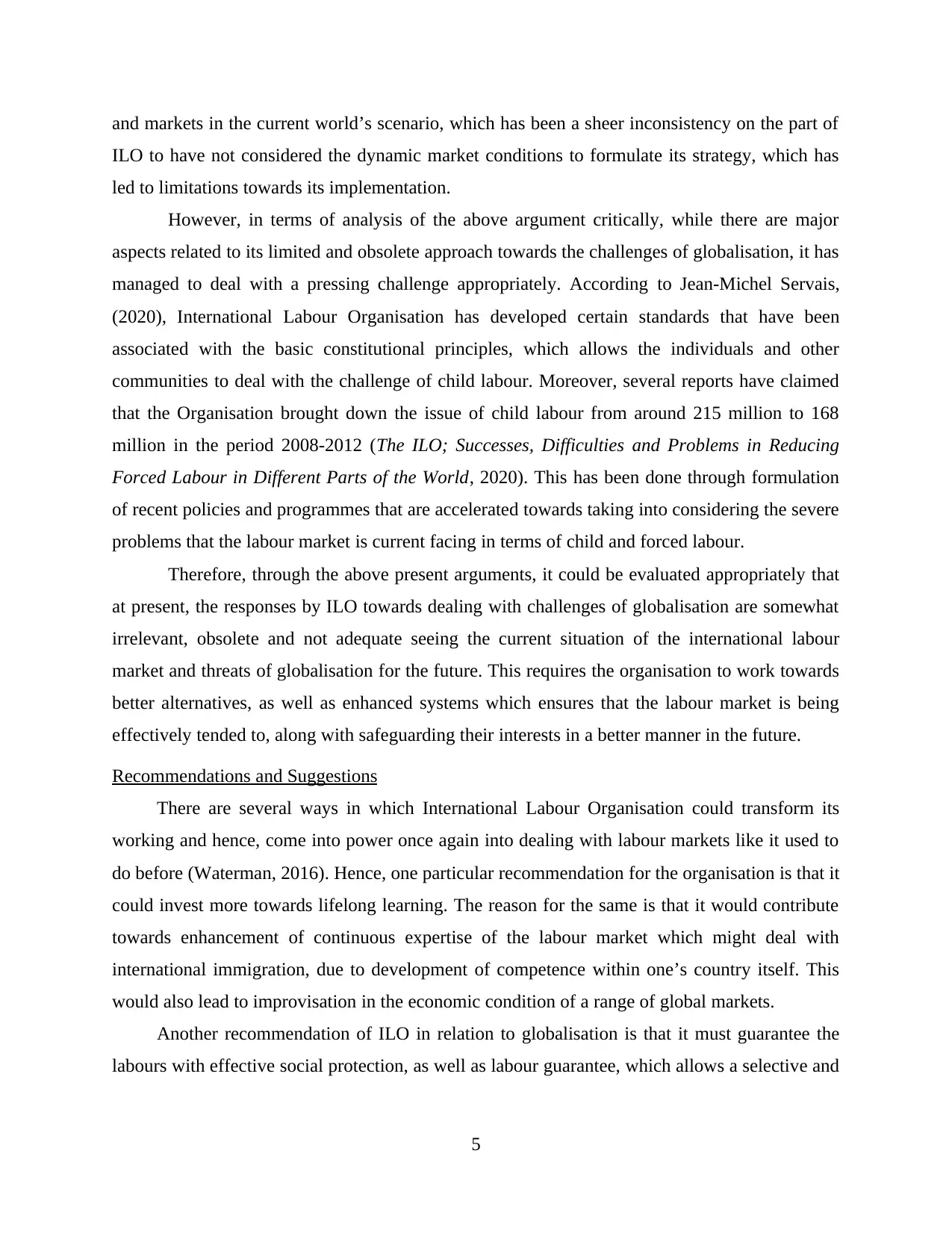
and markets in the current world’s scenario, which has been a sheer inconsistency on the part of
ILO to have not considered the dynamic market conditions to formulate its strategy, which has
led to limitations towards its implementation.
However, in terms of analysis of the above argument critically, while there are major
aspects related to its limited and obsolete approach towards the challenges of globalisation, it has
managed to deal with a pressing challenge appropriately. According to Jean-Michel Servais,
(2020), International Labour Organisation has developed certain standards that have been
associated with the basic constitutional principles, which allows the individuals and other
communities to deal with the challenge of child labour. Moreover, several reports have claimed
that the Organisation brought down the issue of child labour from around 215 million to 168
million in the period 2008-2012 (The ILO; Successes, Difficulties and Problems in Reducing
Forced Labour in Different Parts of the World, 2020). This has been done through formulation
of recent policies and programmes that are accelerated towards taking into considering the severe
problems that the labour market is current facing in terms of child and forced labour.
Therefore, through the above present arguments, it could be evaluated appropriately that
at present, the responses by ILO towards dealing with challenges of globalisation are somewhat
irrelevant, obsolete and not adequate seeing the current situation of the international labour
market and threats of globalisation for the future. This requires the organisation to work towards
better alternatives, as well as enhanced systems which ensures that the labour market is being
effectively tended to, along with safeguarding their interests in a better manner in the future.
Recommendations and Suggestions
There are several ways in which International Labour Organisation could transform its
working and hence, come into power once again into dealing with labour markets like it used to
do before (Waterman, 2016). Hence, one particular recommendation for the organisation is that it
could invest more towards lifelong learning. The reason for the same is that it would contribute
towards enhancement of continuous expertise of the labour market which might deal with
international immigration, due to development of competence within one’s country itself. This
would also lead to improvisation in the economic condition of a range of global markets.
Another recommendation of ILO in relation to globalisation is that it must guarantee the
labours with effective social protection, as well as labour guarantee, which allows a selective and
5
ILO to have not considered the dynamic market conditions to formulate its strategy, which has
led to limitations towards its implementation.
However, in terms of analysis of the above argument critically, while there are major
aspects related to its limited and obsolete approach towards the challenges of globalisation, it has
managed to deal with a pressing challenge appropriately. According to Jean-Michel Servais,
(2020), International Labour Organisation has developed certain standards that have been
associated with the basic constitutional principles, which allows the individuals and other
communities to deal with the challenge of child labour. Moreover, several reports have claimed
that the Organisation brought down the issue of child labour from around 215 million to 168
million in the period 2008-2012 (The ILO; Successes, Difficulties and Problems in Reducing
Forced Labour in Different Parts of the World, 2020). This has been done through formulation
of recent policies and programmes that are accelerated towards taking into considering the severe
problems that the labour market is current facing in terms of child and forced labour.
Therefore, through the above present arguments, it could be evaluated appropriately that
at present, the responses by ILO towards dealing with challenges of globalisation are somewhat
irrelevant, obsolete and not adequate seeing the current situation of the international labour
market and threats of globalisation for the future. This requires the organisation to work towards
better alternatives, as well as enhanced systems which ensures that the labour market is being
effectively tended to, along with safeguarding their interests in a better manner in the future.
Recommendations and Suggestions
There are several ways in which International Labour Organisation could transform its
working and hence, come into power once again into dealing with labour markets like it used to
do before (Waterman, 2016). Hence, one particular recommendation for the organisation is that it
could invest more towards lifelong learning. The reason for the same is that it would contribute
towards enhancement of continuous expertise of the labour market which might deal with
international immigration, due to development of competence within one’s country itself. This
would also lead to improvisation in the economic condition of a range of global markets.
Another recommendation of ILO in relation to globalisation is that it must guarantee the
labours with effective social protection, as well as labour guarantee, which allows a selective and
5
Paraphrase This Document
Need a fresh take? Get an instant paraphrase of this document with our AI Paraphraser
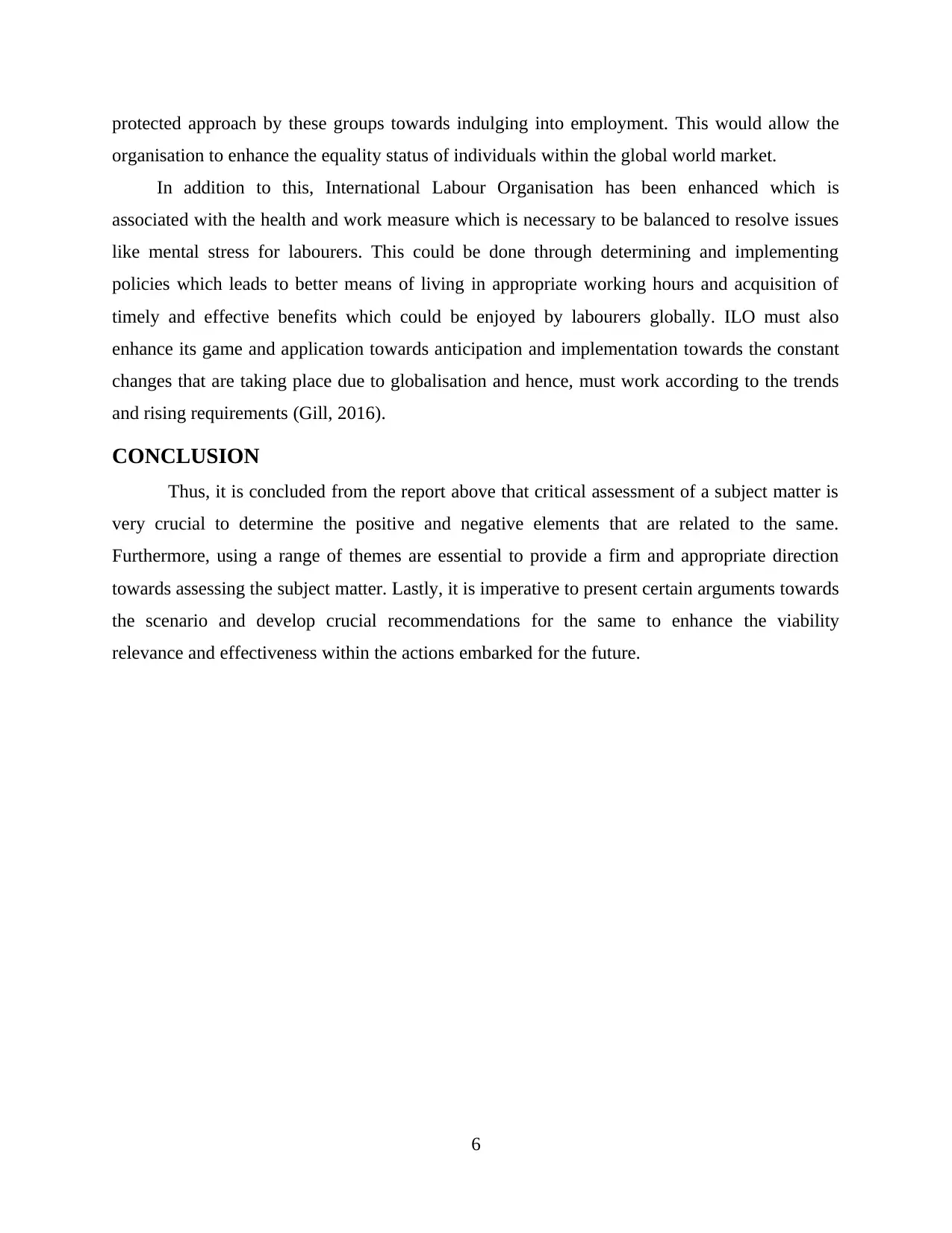
protected approach by these groups towards indulging into employment. This would allow the
organisation to enhance the equality status of individuals within the global world market.
In addition to this, International Labour Organisation has been enhanced which is
associated with the health and work measure which is necessary to be balanced to resolve issues
like mental stress for labourers. This could be done through determining and implementing
policies which leads to better means of living in appropriate working hours and acquisition of
timely and effective benefits which could be enjoyed by labourers globally. ILO must also
enhance its game and application towards anticipation and implementation towards the constant
changes that are taking place due to globalisation and hence, must work according to the trends
and rising requirements (Gill, 2016).
CONCLUSION
Thus, it is concluded from the report above that critical assessment of a subject matter is
very crucial to determine the positive and negative elements that are related to the same.
Furthermore, using a range of themes are essential to provide a firm and appropriate direction
towards assessing the subject matter. Lastly, it is imperative to present certain arguments towards
the scenario and develop crucial recommendations for the same to enhance the viability
relevance and effectiveness within the actions embarked for the future.
6
organisation to enhance the equality status of individuals within the global world market.
In addition to this, International Labour Organisation has been enhanced which is
associated with the health and work measure which is necessary to be balanced to resolve issues
like mental stress for labourers. This could be done through determining and implementing
policies which leads to better means of living in appropriate working hours and acquisition of
timely and effective benefits which could be enjoyed by labourers globally. ILO must also
enhance its game and application towards anticipation and implementation towards the constant
changes that are taking place due to globalisation and hence, must work according to the trends
and rising requirements (Gill, 2016).
CONCLUSION
Thus, it is concluded from the report above that critical assessment of a subject matter is
very crucial to determine the positive and negative elements that are related to the same.
Furthermore, using a range of themes are essential to provide a firm and appropriate direction
towards assessing the subject matter. Lastly, it is imperative to present certain arguments towards
the scenario and develop crucial recommendations for the same to enhance the viability
relevance and effectiveness within the actions embarked for the future.
6
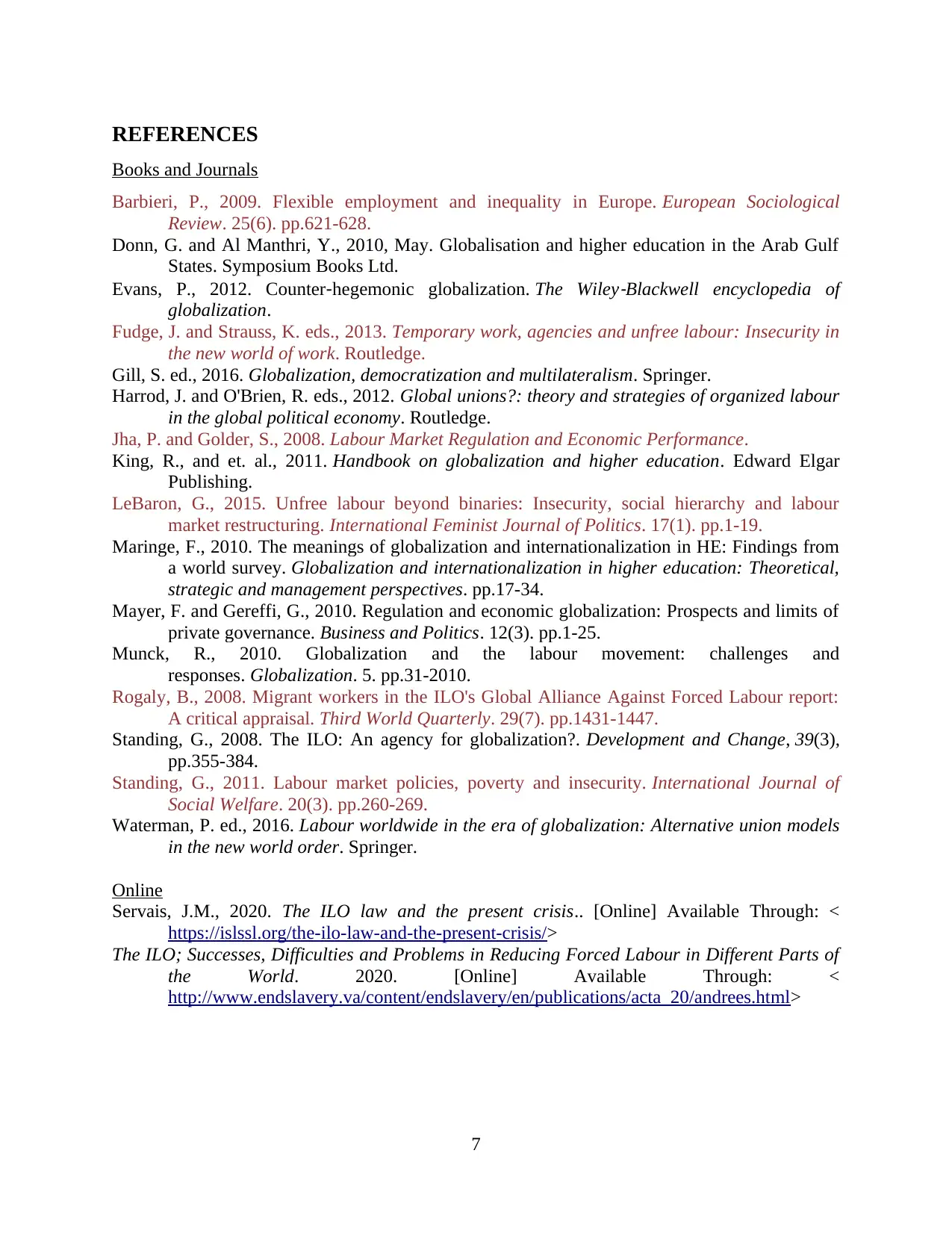
REFERENCES
Books and Journals
Barbieri, P., 2009. Flexible employment and inequality in Europe. European Sociological
Review. 25(6). pp.621-628.
Donn, G. and Al Manthri, Y., 2010, May. Globalisation and higher education in the Arab Gulf
States. Symposium Books Ltd.
Evans, P., 2012. Counter‐hegemonic globalization. The Wiley
‐Blackwell encyclopedia of
globalization.
Fudge, J. and Strauss, K. eds., 2013. Temporary work, agencies and unfree labour: Insecurity in
the new world of work. Routledge.
Gill, S. ed., 2016. Globalization, democratization and multilateralism. Springer.
Harrod, J. and O'Brien, R. eds., 2012. Global unions?: theory and strategies of organized labour
in the global political economy. Routledge.
Jha, P. and Golder, S., 2008. Labour Market Regulation and Economic Performance.
King, R., and et. al., 2011. Handbook on globalization and higher education. Edward Elgar
Publishing.
LeBaron, G., 2015. Unfree labour beyond binaries: Insecurity, social hierarchy and labour
market restructuring. International Feminist Journal of Politics. 17(1). pp.1-19.
Maringe, F., 2010. The meanings of globalization and internationalization in HE: Findings from
a world survey. Globalization and internationalization in higher education: Theoretical,
strategic and management perspectives. pp.17-34.
Mayer, F. and Gereffi, G., 2010. Regulation and economic globalization: Prospects and limits of
private governance. Business and Politics. 12(3). pp.1-25.
Munck, R., 2010. Globalization and the labour movement: challenges and
responses. Globalization. 5. pp.31-2010.
Rogaly, B., 2008. Migrant workers in the ILO's Global Alliance Against Forced Labour report:
A critical appraisal. Third World Quarterly. 29(7). pp.1431-1447.
Standing, G., 2008. The ILO: An agency for globalization?. Development and Change, 39(3),
pp.355-384.
Standing, G., 2011. Labour market policies, poverty and insecurity. International Journal of
Social Welfare. 20(3). pp.260-269.
Waterman, P. ed., 2016. Labour worldwide in the era of globalization: Alternative union models
in the new world order. Springer.
Online
Servais, J.M., 2020. The ILO law and the present crisis.. [Online] Available Through: <
https://islssl.org/the-ilo-law-and-the-present-crisis/>
The ILO; Successes, Difficulties and Problems in Reducing Forced Labour in Different Parts of
the World. 2020. [Online] Available Through: <
http://www.endslavery.va/content/endslavery/en/publications/acta_20/andrees.html>
7
Books and Journals
Barbieri, P., 2009. Flexible employment and inequality in Europe. European Sociological
Review. 25(6). pp.621-628.
Donn, G. and Al Manthri, Y., 2010, May. Globalisation and higher education in the Arab Gulf
States. Symposium Books Ltd.
Evans, P., 2012. Counter‐hegemonic globalization. The Wiley
‐Blackwell encyclopedia of
globalization.
Fudge, J. and Strauss, K. eds., 2013. Temporary work, agencies and unfree labour: Insecurity in
the new world of work. Routledge.
Gill, S. ed., 2016. Globalization, democratization and multilateralism. Springer.
Harrod, J. and O'Brien, R. eds., 2012. Global unions?: theory and strategies of organized labour
in the global political economy. Routledge.
Jha, P. and Golder, S., 2008. Labour Market Regulation and Economic Performance.
King, R., and et. al., 2011. Handbook on globalization and higher education. Edward Elgar
Publishing.
LeBaron, G., 2015. Unfree labour beyond binaries: Insecurity, social hierarchy and labour
market restructuring. International Feminist Journal of Politics. 17(1). pp.1-19.
Maringe, F., 2010. The meanings of globalization and internationalization in HE: Findings from
a world survey. Globalization and internationalization in higher education: Theoretical,
strategic and management perspectives. pp.17-34.
Mayer, F. and Gereffi, G., 2010. Regulation and economic globalization: Prospects and limits of
private governance. Business and Politics. 12(3). pp.1-25.
Munck, R., 2010. Globalization and the labour movement: challenges and
responses. Globalization. 5. pp.31-2010.
Rogaly, B., 2008. Migrant workers in the ILO's Global Alliance Against Forced Labour report:
A critical appraisal. Third World Quarterly. 29(7). pp.1431-1447.
Standing, G., 2008. The ILO: An agency for globalization?. Development and Change, 39(3),
pp.355-384.
Standing, G., 2011. Labour market policies, poverty and insecurity. International Journal of
Social Welfare. 20(3). pp.260-269.
Waterman, P. ed., 2016. Labour worldwide in the era of globalization: Alternative union models
in the new world order. Springer.
Online
Servais, J.M., 2020. The ILO law and the present crisis.. [Online] Available Through: <
https://islssl.org/the-ilo-law-and-the-present-crisis/>
The ILO; Successes, Difficulties and Problems in Reducing Forced Labour in Different Parts of
the World. 2020. [Online] Available Through: <
http://www.endslavery.va/content/endslavery/en/publications/acta_20/andrees.html>
7
⊘ This is a preview!⊘
Do you want full access?
Subscribe today to unlock all pages.

Trusted by 1+ million students worldwide
1 out of 9
Related Documents
Your All-in-One AI-Powered Toolkit for Academic Success.
+13062052269
info@desklib.com
Available 24*7 on WhatsApp / Email
![[object Object]](/_next/static/media/star-bottom.7253800d.svg)
Unlock your academic potential
Copyright © 2020–2026 A2Z Services. All Rights Reserved. Developed and managed by ZUCOL.





